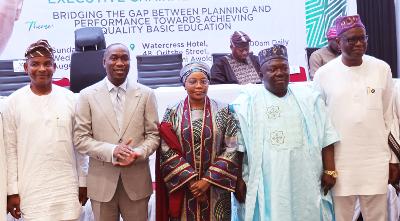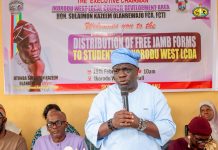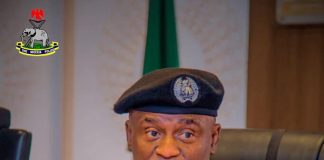Lagos State Governor, Babajide Olusola Sanwo-Olu, has reiterated that his administration is committed to enhancing education by investing in teachers’ development and fostering environments that promote student success.
The Governor made this remark today at the 27th Quarterly Meeting of the Universal Basic Education Commission (UBEC) Management with the Executive Chairmen of the State Universal Basic Education Boards (SUBEBS), themed “Bridging the Gap between Planning and Performance towards Achieving Quality Basic Education,” held at Watercress Hotel, Ikeja, Lagos.
Sanwo-Olu, who spoke through the Deputy Governor, Dr. Kadri Obafemi Hamzat, stated that the state has prioritised building world-class educational infrastructure, as evidenced by the recent commissioning of ultra-modern classroom blocks, integrated vocational training, and digital literacy initiatives under our THEMES Plus Agenda.
According to him, “Here in Lagos, we have prioritised building world-class educational infrastructure, as evidenced by our recent commissioning of ultra-modern classroom blocks, integrated vocational training, and digital literacy initiatives under our THEMES Plus Agenda. We understand that advancing education means equipping teachers through professional development programs and fostering a learning environment where every child can thrive.”
The Governor added that education is the cornerstone of socio-economic development, and when the state invests in the children’s education, it invests in Nigeria’s future prosperity, noting that he is certain that the gathering will be a reaffirmation of the responsibility to bridge the gap between planning and performance and to leave no child behind.
Speaking on the theme of the event, the Governor stated that it is a call to translate sound policies and detailed plans into tangible improvements in teaching and learning outcomes that will directly impact the lives of millions of Nigerian children.
Speaking further, Sanwo-Olu noted that challenges that were brought forward from previous meetings, which included utilization of funds, unlocking matching grants, infrastructure deficits, teacher quality and capacity building, and addressing out-of-school children, are critical issues with real consequences. He therefore bemoaned that “Failure to address those challenges risks depriving our children of environments conducive to learning and teachers of the resources necessary to inspire and educate,” he said.
He added that the quarterly meeting focuses on aligning effective reporting and tracking mechanisms for evidence-informed decision-making and accountability means that transparent and timely data will strengthen the state’s ability to evaluate progress, make strategic adjustments, and ultimately ensure that every naira spent delivers measurable improvements in education quality.
In her welcome remarks, Executive Secretary, Universal Basic Education Commission (UBEC), Aisha Garba, called on education stakeholders, particularly state and local governments, to work together to ensure that all children across Nigeria have access to quality music education.
She emphasized that bringing together all actors at the state and community levels, especially parents, to collaborate with the Commission in implementing music education is essential to strengthening the nation’s education system.
Garba explained that a key part of bridging existing gaps is to deepen partnerships with local government education authorities, noting that this will enhance supervision, accountability, and transparency. She stressed that while policies exist, true progress will only come through state collaboration, commitment, and consistency, which will collectively advance the vision of achieving universal basic education in the country.
She further highlighted that inclusion is important, and most critically, the nation must establish effective mechanisms to track progress, monitor, and evaluate implementation efforts. Garba concluded that every Nigerian child must have access to at least the minimum level of foundational learning in music education, reiterating that by ensuring inclusivity and consistency in implementation, no child will be left behind.















